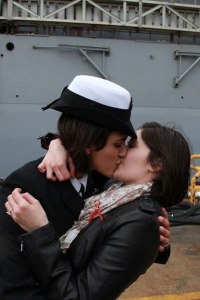This post was originally published on this site
Fifty Chosen Articles:
Number Three.
This was the first article posted in 2012 – the eighteenth on AA Agnostica.
It’s about not being able to be honest at a traditional AA meeting if you don’t believe in a God. You have to keep your mouth shut.
The reality of all of this led to the publication of two books by AA Agnostica. The first is Don’t Tell, published in 2014, which contains 64 stories and essays posted in the first three years of AA Agnostica. And the second, published a year later, is Do Tell, which contains 30 stories, an equal number by men and women, all about their recovery without a male Christian deity.
By Roger C.
There often seems to be an unofficial policy in Alcoholics Anonymous especially for nonbelievers at AA meetings: “Don’t Tell.”
It is a policy imposed by just a few but rarely challenged.
If you are an atheist, agnostic, humanist or secularist you had best keep your lack of belief in a deity to yourself. (And yet, according to Bill W., AA is officially for everyone “regardless of their belief or lack of belief”).
Here’s an example of the problem: John M tells about how easily everyone accepts it when an AA speaker says, “I owe this to my Higher Power whom I choose to call God.”
“No problem here!” John writes, and he continues:
However, a long standing sober member of my home group once told me that when she was sharing at a closed meeting she spoke of her higher power “whom I choose not to call God.” The looks she got, the raised eyebrows, the shuffling of fannies in the chairs indicated to her that her declaration was a problem for many in the room. At that moment, it felt to her as if she had uttered a blasphemy.
“Don’t Tell.” That’s the policy for nonbelievers in AA.
There are three main ways to be “outed” as an agnostic in Alcoholics Anonymous:
- By sharing, as John’s friend did.
- By removing the word “God” from the 12 Step program of recovery. In 1939 the words “as we understood Him” were added to “God” in the suggested 12 Steps. Today, for many nonbelievers, that compromise is not enough. The word “God” is removed while the intent of the Step is maintained.
- By declining to recite the Lord’s Prayer at the end of an AA meeting.
Some readers will be familiar with the “Don’t Ask Don’t Tell” policy which was for some time the official United States policy on homosexuals serving in the military. The policy prohibited discriminating against or harassing closeted homosexual or bisexual service members, while barring openly gay or lesbian persons from military service.
The “Don’t Tell” part of the policy meant that if you didn’t let on that you were a gay or a lesbian then you could still be a member in good standing of the armed forces. If you admitted you were a homosexual, however, then you were kicked out.
The “Don’t Ask” part meant that nobody could ask you if you were a gay or a lesbian. Or even a bi-sexual. And the top brass couldn’t investigate to find out; they couldn’t go to your home, ask your friends or follow you to bars or meetings.
There doesn’t appear to be a “Don’t Ask” part in this policy in AA.
A rumour circulated in the Toronto area that there was a new AA group in Richmond Hill which, although it read the traditional 12 Steps of AA, also shared an interpretation of some of the steps without the “God” word.
Four self-appointed AA police officers decided to investigate and showed up at a Widening Our Gateway meeting on Sunday, November 20, 2011, and sure enough, they concluded, there was evidence of tampered Steps.
A month later, on December 20, one of these detectives presented a motion at Intergroup that Widening Our Gateway be suspended from Intergroup membership for changing the Steps.
The motion will be voted on at the next Intergroup meeting.

Marissa Gaeta and Citalic Snell: The kiss that marked the end of “Don’t Ask Don’t Tell.”
Meanwhile back in the United States military, the “Don’t Ask Don’t Tell” policy finally came to an end on September 20, 2011. It took a while for the new rules to take effect but on December 21, in an article headlined “Gay Navy Couple Torpedo Don’t Ask Don’t Tell with First Kiss,” the San Diego News reported on an historic moment. Petty Officer Marissa Gaeta and her partner Citalic Snell became the first gay couple in Navy history to share the “first kiss” moment when the navy ship USS Oak Hill returned from Central America.
The News further reported that Gaeta told a gaggle of reporters: “It’s something new, that’s for sure. It’s nice to be able to be myself. It’s been a long time coming.”
Will the “Don’t Tell” policy at AA meetings ever come to an end?
Of course.
AA as a fellowship will meet this new challenge or, as Joe, a founding member of an agnostic AA group put it: “My bold prediction is that if AA doesn’t accommodate change and diversify, our 100th anniversary will be a fellowship of men and women with the same stature and relevance as the Mennonites; charming, harmless and irrelevant.”
Remember, everything is always impossible until, well, it turns out to be both possible and normal. Look at the picture of Marissa and Citalic again.
It’s been a long time coming but nonbelievers will yet have a place in the rooms of AA.
In the meantime, for God’s sake:
“Don’t Tell.”
For a PDF of this article, click here: The “Don’t Tell” Policy in AA.
The post The “Don’t Tell” Policy in AA first appeared on AA Agnostica.

